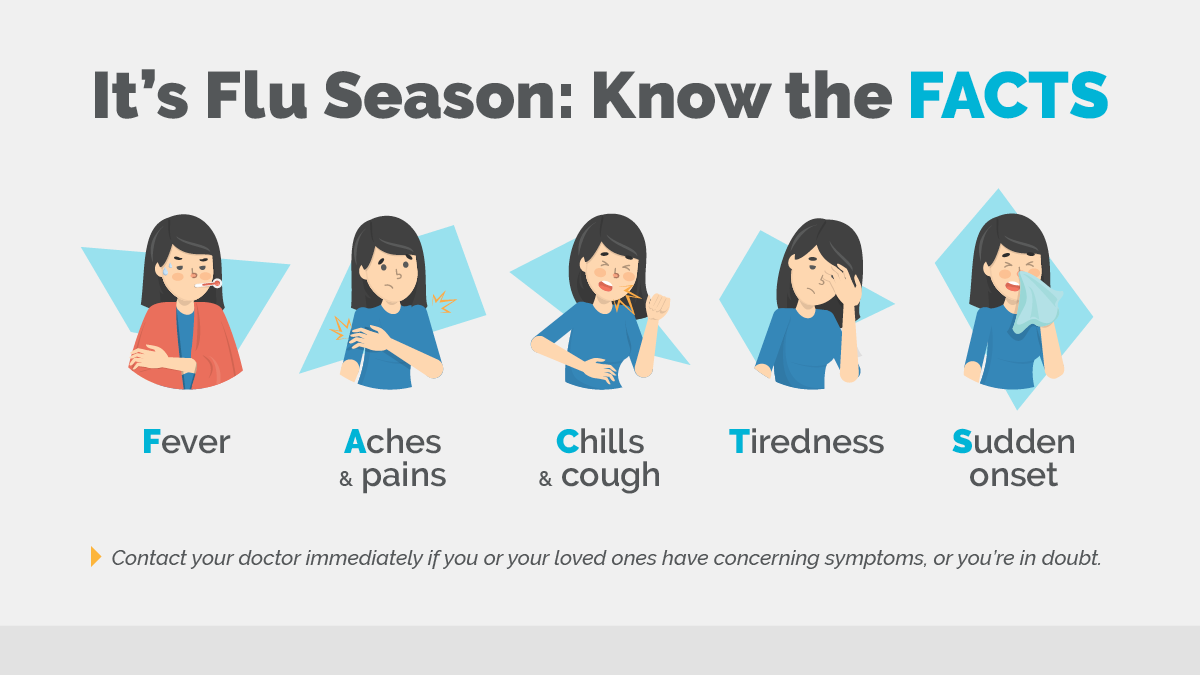How to Survive Flu Season
A good offense is the best defense during flu season. Being proactive about prevention will help you and the people you serve avoid spreading the illness.
4 Reasons to Take the Flu Seriously
1 – It spreads easily. You can infect others one day before symptoms develop and remain contagious 5 to 7 days after becoming sick. And you can spread it to others up to about 6 feet away. The Centers for Disease Control and Prevention (CDC) recommend staying home until you are fever-free without the use of medication for 24 hours to avoid exposing others.
2 – It’s making the rounds nationwide. Flu activity has been high since October. The CDC estimates that, in the short amount of time from October 1, 2019 to February 1, 2020, the flu has:
- Sickened 22 – 31 million people
- Sent 10 – 15 million people to the doctor
- Hospitalized 210,000 to 370,000 people
- Caused 12,000 to 30,000 deaths
3 – It can make you even sicker. Flu-related complications include sepsis, bacterial pneumonia, ear infections, sinus infections and worsening of chronic medical conditions, such as congestive heart failure, asthma or diabetes. Adults over 65, young children, pregnant women and those with a weakened immune system stemming from disease or a chronic illness are considered to be at high risk for these complications.
4 – It’s unpredictable. There are three types of flu viruses that impact humans: A, B and C. (You don’t hear about Influenza C as much because it’s milder and doesn’t cause epidemics.) Because each flu virus changes constantly, flu vaccines differ every year in an effort to match the season’s circulating strains.
5 Ways to Help Stay Flu Free
1 – Get an annual seasonal flu shot. It’s the best way to avoid the flu or decrease the severity of symptoms if you do get sick, according to the CDC. Although it’s recommended to get the shot by the end of October, it’s not too late to get vaccinated even now because flu season can extend into May. “Even if the annual vaccine is not a perfect match to the season’s dominant flu strains, it still affords you some level of protection and can help prevent serious flu-related complications like hospitalization and death,” says Serese Marotta, Chief Operating Officer of Families Fighting Flu, Inc., a nonprofit advocacy organization dedicated to protecting children, families and communities against the flu.
2 – Wash your hands often. Each time you wash, aim to do so for at least 20 seconds. When soap and water are not available, use an alcohol-based hand sanitizer.
3 – Regularly clean and disinfect. The flu virus can live on hard surfaces for up to 48 hours. Keep tissues, soap, paper towels, and alcohol-based hand rubs and disposable wipes at the ready at home, at work and in the car so you can kill germs on frequently touched objects, such as doorknobs, faucet handles, keyboards and phones.
4 – Encourage employees to stay home when sick. It’s the best way to prevent the spread of flu within your organization. Be sure that your employee sick leave policies allow for employees to stay home when ill.
5 – Know how to respond to an outbreak. Make sure your organization establishes a plan in responding to illness outbreaks at any point during the year.
If a pandemic or epidemic situation does occur, follow public health guidelines and advice. Also consider social distancing, which the U.S. Occupational Safety and Health Administration describes as reducing the frequency, proximity and duration of contact between people. This may include limiting in-person meetings, conversing more via email or phone, or even temporarily closing your organization. The CDC’s Weekly Influenza Surveillance Report allows you to monitor current seasonal influenza outbreaks so you can respond accordingly.
What to Do if You Get Sick
Know the FACTS. “A lot of people confuse the flu with the common cold, but flu is a potentially serious disease,” Marotta says.
This easy acronym can help you make sense of flu symptoms:

Consider taking an antiviral ASAP. “Antivirals can help stop the flu virus from replicating and causing further infection,” Marotta says. “The earlier the intervention, the better.” When taken within 48 hours of the onset of illness, antivirals can lessen symptoms, duration of illness, and complications.
Stay home and limit contact with others. “You really shouldn’t be leaving your house unless you are fever-free without the aid of medication for 24 hours,” Marotta says. If you must be around people, wear a facemask. If you don’t have one, sneeze and cough into a tissue or your elbow.
Spread Awareness, Not Germs
You can find flu awareness information and resources here:
Families Fighting Flu: Flu Virus & Vaccine Resources for Communities
CDC Flu Activity & Surveillance
Sources:
Centers for Disease Control and Prevention: Flu Season | Everyday Preventive Actions That Can Help Fight Germs, Like Flu | Key Facts About Influenza (Flu) | Key Facts About Seasonal Flu Vaccine |Families Fighting Flu: Flu Facts | United States Department of Labor: OSHA: Guidance on Preparing Workplaces for an Influenza Pandemic
This material is for informational purposes only. It is not intended to give medical advice, you are encouraged to retain your own experts to develop a plan.
© 2025 GuideOne Insurance. GuideOne® is the registered trademark of the GuideOne Insurance Company. All rights reserved. This material is for informational purposes only. It is not intended to give specific legal or risk management advice, nor are any suggested checklists or action plans intended to include or address all possible risk management exposures or solutions. You are encouraged to retain your own expert consultants and legal advisors in order to develop a risk management plan specific to your own activities.